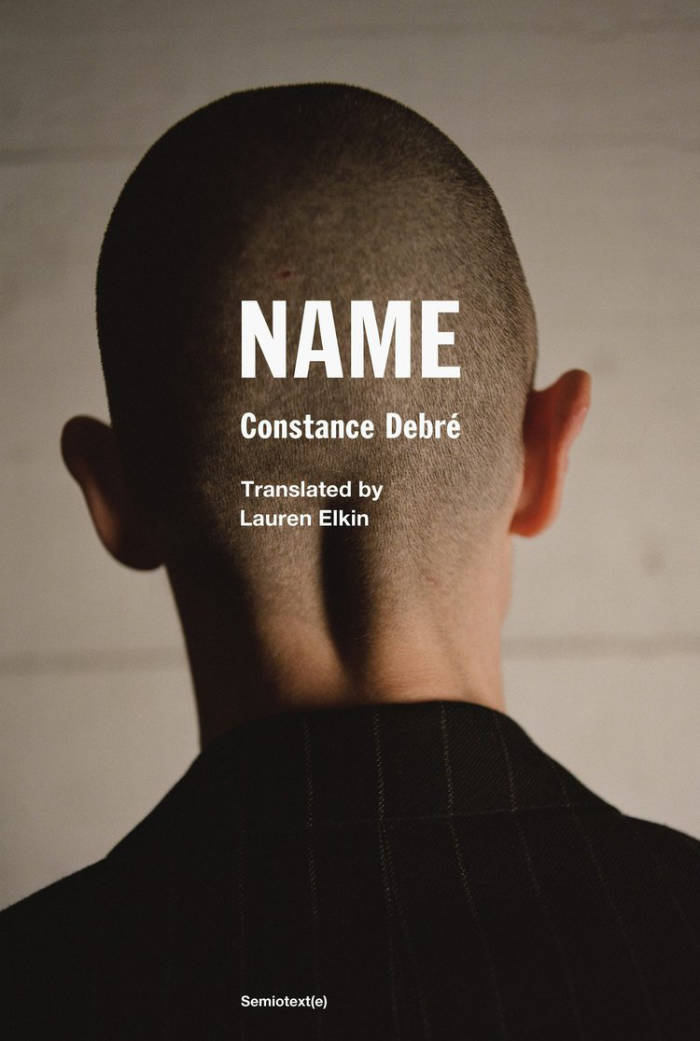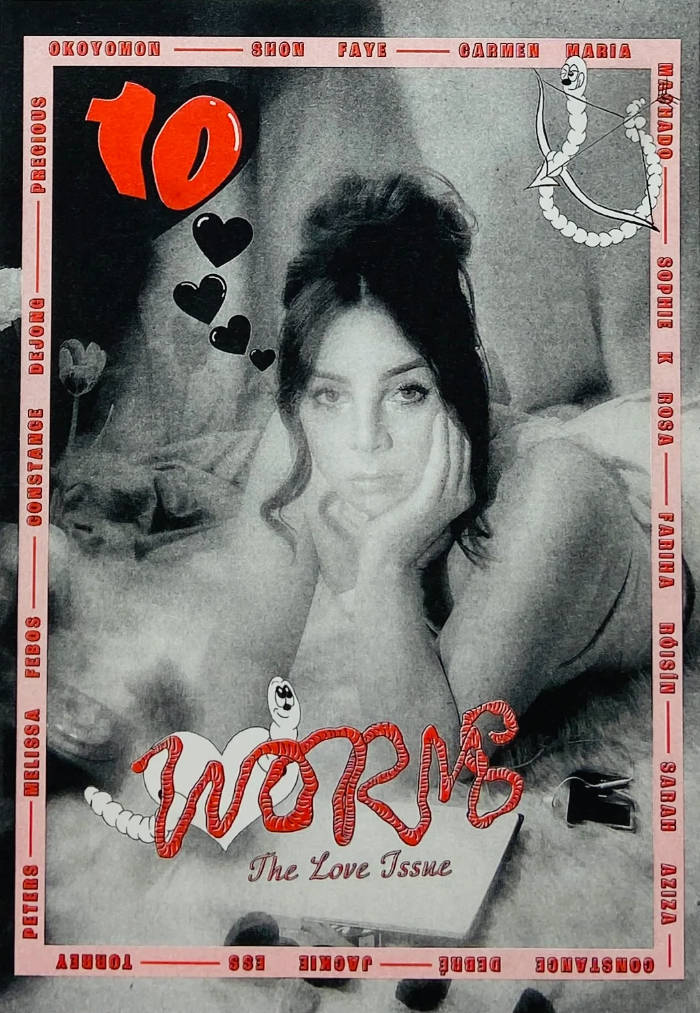Constance Debré
Constance Debré

Name
Name, the third novel in Constance Debré’s acclaimed trilogy, is at once a manifesto, an ecstatic poem, and a political pamphlet. By rejecting the notion of given identity, her narrator approaches the heart of the radical emptiness that the earlier books were pursuing.
Newly single, and having recently come out as a lesbian, the narrator of Debré’s first two novels embarked on a monastic regime of exercise, sex, and writing. Using the facts of her own life as impersonal “material” for literature, Playboy and Love Me Tender epitomized what Debré (after Thomas Bernhard) has called “antiautobiography.” They introduced French and American readers to her fiercely spare prose, distilled from influences as disparate as Saint Augustine, Albert Camus, and Guillaume Dustan. “Minimalist and at times even desolate,” wrote the New York Review of Books, these works defied “the expectations of personal growth that animate much feminist literature.”
Name is Debré’s most intense novel yet. Set partly in the narrator’s childhood, it rejects Proustian notions of “regaining” the past. Instead, its narrator seeks a state of profound disownment: “We have to get rid of the idea of origins, once and for all, I’m not holding on to the corpses. … Being free has nothing to do with that clutter, with having suffered or not, being free is the void.” To achieve true freedom, she dares to enter this “void”—that is, dares to accept the pain, loss, and violence of life. Brilliant and searing, Name affirms and extends Debré’s radical project.

Playboy
The prequel to Love Me Tender, narrating Debré's transformation from affluent career woman to broke single lesbian and writer.
I see all her beauty, I see the beauty of women. I see my own body, new. I tell myself there are so many things that are possible.
First published in France in 2018, Playboy is the first volume of Constance Debré's renowned autobiographical trilogy that describes her decision, at age forty-three, to abandon her marriage, her legal career, and her bourgeois Parisian life to become a lesbian and a writer.
The novel unfolds in a series of short, sharp vignettes. The narrator's descriptions of her first female lovers—a married woman fifteen years older than her, a model ten years her junior—are punctuated by encounters with her ex-husband, her father, and her son.
As Debré recently told Granta: “It was a bit like Saint Augustine and his conversion. In the same week, I had sex with a girl and I had the feeling that I could write. I had this incredible feeling that I could catch things, that life was there to be caught.”
Looking at the world through fresh eyes, the narrator of Playboy questions everything that once lay beneath the surface of her well-managed life. Laconic, aggressive, and radically truthful, she examines gender and marriage, selfishness and sacrifice, money and family, even the privilege inherent in her downward mobility.
Writing her way toward her own liberation, Debré chronicles the process that made her one of the most brilliant, important French writers today.

Love Me Tender
A novel of lesbian identity and motherhood, and the societal pressures that place them in opposition.
The daughter of an illustrious French family whose members include a former Prime Minister, a model, and a journalist, Constance Debré abandoned her marriage and legal career in 2015 to write full-time and begin a relationship with a woman. Her transformation from affluent career woman to broke single lesbian was chronicled in her 2018 novel Play boy, praised by Virginie Despentes for its writing that is at once "flippant and consumed by anxiety."
In Love Me Tender, Debré goes on to further describe the consequences of that life-changing decision. Her husband, Laurent, seeks to permanently separate her from their eight-year old child. Vilified in divorce court by her ex, she loses custody of her son and is allowed to see him only once every two weeks for a supervised hour. Deprived of her child, Debré gives up her two-bedroom apartment and bounces between borrowed apartments, hotel rooms, and a studio the size of a cell. She involves herself in brief affairs with numerous women who vary in age, body type, language, and lifestyle. But the closer she gets to them, the more distant she feels. Apart from cigarettes and sex, her life is completely ascetic: a regime of intense reading and writing, interrupted only by sleep and athletic swimming. She shuns any place where she might observe children, avoiding playgrounds and parks "as if they were cluster bombs ready to explode, riddling her body with pieces of shrapnel."
Writing graphically about sex, rupture, longing, and despair in the first person, Debré's work is often compared with the punk-era writings of Guillaume Dustan and Herve Guibert, whose work she has championed. As she says of Guibert: "I love him because he says I and he's a pornographer. That seems to be essential when you write. Otherwise you don't say anything." But in Love Me Tender, Debré speaks courageously of love in its many forms, reframing what it means to be a mother beyond conventional expectations.
And more

Worms #10: The Love Issue
Clem Macleod, Caitlin McLoughlin and 2 more
This latest issue of Worms invites readers into a bold and tender exploration of love in all its messy, political, and transformative guises.
Set against the backdrop of state-sanctioned transphobia in the UK and US, ongoing genocide in Gaza, and a litany of global injustices that see us staggering under the weight of collective and personal upheaval, this issue reckons with thinking and writing about love in a time of crisis. How do we take seriously the seemingly frivolous demands of love, devotion, beauty—in all their myriad and sometimes painful forms—when basic needs and rights are stripped away.
Featuring voices from at home and overseas including Shon Faye, Torrey Peters, Melissa Febos, Constance DeJong, Sarah Aziza, Precious Okoyomon, Carmen Maria Machado and Constance Debré, as well as contributions from rising stars in experimental literature, we ask: How can we continue to love someone who refuses to change? Is writing about sex still strange – or have we done and seen it all? What do you do if you fall in love with your sperm donor?
From the resilience and fierce creativity of trans writers, the challenges and ethics of telling love stories that are not our own, to the guts and gristle of motherhood, pet love, age-gap relationships and getting off on poetry, Worms 10 is a testament to the power of writing, and of love, as acts of resistance, reclamation and truth.
FEATURING: Shon Faye, Jackie Ess, Precious Okoyomon, Constance Debré, Melissa Febos, Torrey Peters, Carmen Maria Machado, Sarah Aziza, Constance DeJong, Sophie K Rosa
CONTRIBUTORS: Caitlin Hall, Zara Joan Miller, Devki Panchmatia, Lu Rose Cunningham, Gabrielle Sicam, Aimée Ballinger, Mimi Howard, Enya Ettershank, Sufjan Bile, MK McGrath, Amie Corry, Dizzy Zaba, 2ly (Molly Cranston, Safiye Gray, Hanako Emden, Sophie Florian, Johanna Maierski), Jemima Skala, Fariha Róisín, Summer Moraes
PHOTOGRAPHERS: Minu, Dozie Kanu, Jen Dessinger, Karla Monroe, Sophie Williams, Ellen Stewar
ILLUSTRATORS: Rifke Sadleir, Chloe Sheppard, Charlotte Pelissier, Leomi Sadler
EDITORS: Caitlin McLoughlin, P. Eldridge, Clem MacLeod, Arcadia Molinas
DESIGN: Caitlin McLoughlin